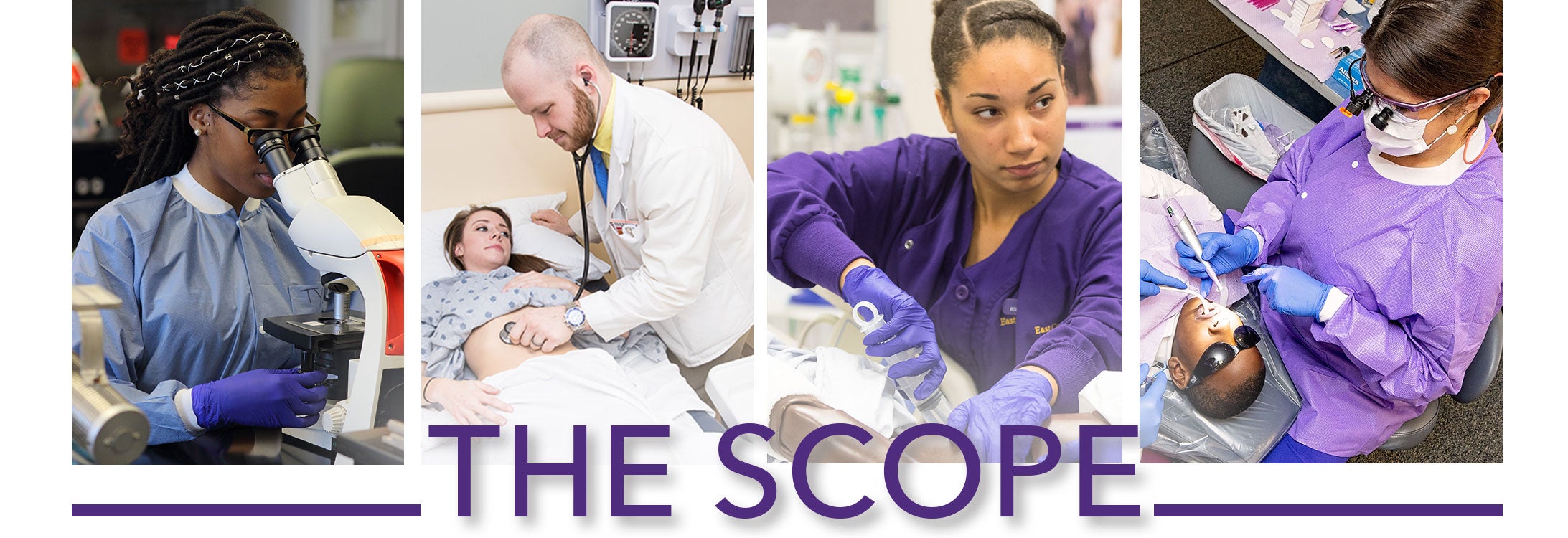December 2021
Welcome to “The Scope,” the newsletter of the ECU Division of Health Sciences.
East Carolina University and the Brody School of Medicine extend a “thank you” to the State of North Carolina for its investment in a new medical education building and for its belief in Brody’s ability to serve the residents of our state.
“State leaders sent a strong message of support for the UNC System and ECU with historic investments in our top priorities, including salary increases, repair and renovation funds and new capital projects,” ECU Chancellor Philip Rogers said. “We are excited about what the state funding means for our future and the ways it will increase ECU’s ability to deliver on our mission.”
The new medical education building and repair and renovation funding will allow faculty and staff to train students for generations to come on ECU’s campuses. Funding allocated for programs like rural medical residencies and NC-STeP will train providers to serve in rural settings while delivering much needed health care in underserved areas.
Included in the state budget that Gov. Roy Cooper signed into law Nov. 18 is funding for a new ECU medical education building.
The state budget provides $21.5 million in Fiscal Year 2021-22 and $53.75 million in FY2022-23 from the State Capital and Infrastructure Fund for planning and construction of the building with a total authorization of $215 million.
“This is a landmark moment for the future of rural health care and medical education in our state and region,” Rogers said. “We are grateful to state leaders for investing in our bold and innovative mission to ensure access to quality culturally competent care through a seamless delivery system and a better quality of life for people in the East.”
The state’s decision to fund a new medical education building for East Carolina University highlights the difference that the Brody School of Medicine makes across North Carolina.
“The impact this new facility will have on patient care, education, research and regional health is immeasurable,” said Dr. Michael Waldrum, dean of the Brody School of Medicine and CEO of Vidant Health.
“The new classrooms, clinical space, labs and technology will allow our faculty to build on the tradition of excellence at the Brody School of Medicine as we educate the next generation of North Carolina’s physicians to provide care in our region and across the state,” he said.
Visit this video on YouTube for the closed-captioned version.
Rural Engagement
The Division of Health Sciences is bringing its mission to life through initiatives aimed at improving access to care for patients across the region.
Faculty in the Division of Health Sciences are collaborating on grant-funded efforts to enhance connectivity for home-based telehealth primary care access for patients in rural eastern North Carolina counties.
The project titled, “Consortium for Home-based Telehealth” is being led by faculty in ECU’s Brody School of Medicine and the ECU School of Dental Medicine. It is supported by a grant from the Health and Human Services Administration (HRSA) in the U.S. Department of Health and Human Services for $350,000 per year, for five years for a total of $1.75 million.
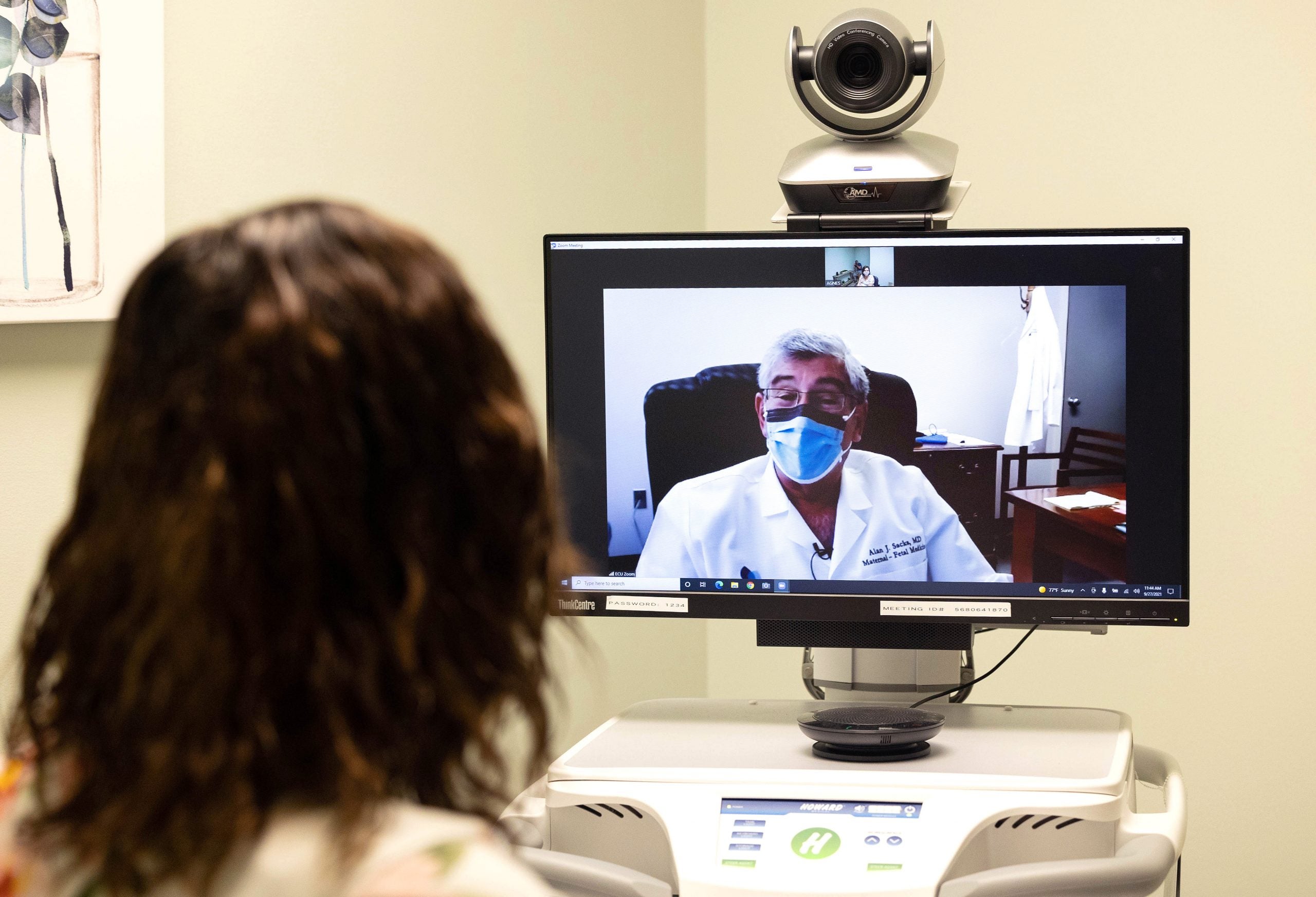
The MOTHeRS Project is increasing access to health care for North Carolina mothers using a combination of telemedicine, telepsychiatry and nutrition support. (Photo by Rhett Butler)
The project aims to help increase patient opportunities for telehealth care by leveraging broadband and cellular access for telehealth in the targeted rural communities and examining specific barriers and facilitators to home-based telehealth services.
“This project is about better understanding the value and effectiveness of delivering selected components of a patient’s medical and dental care in the home, using telehealth-enabled technology and to really evaluate how that works,” said Dr. Doyle “Skip” Cummings, project co-director and professor in Brody’s Departments of Family Medicine and Public Health. “The grant is also about evaluating how we can use telehealth to keep people healthy and mitigate disease.”
Focusing on the eastern North Carolina counties of Beaufort, Bertie, Hertford, Duplin, Martin, Northampton and Pasquotank, project collaborators will work to provide selected aspects of acute and chronic primary medical care, dental evaluation and referral, behavioral health, nutrition and pharmacy counseling, and chronic disease management via telehealth in the home setting. Increased access to telehealth care is expected to improve access to both local and regional providers, lower costs and produce clinical measures comparable to face-to-face care.
The team’s leaders also include Dr. Andres Flores, project co-director and division director of oral and maxillofacial pathology in the ECU School of Dental Medicine; Jill Jennings, clinical nutrition specialist in Brody’s Department of Family Medicine and manager of the Healthier Lives at School and Beyond school-based telehealth program; and Hannah Barnett, research associate, and includes support from Dr. Audy Whitman, Rural Residency program director in Brody’s Department of Family Medicine.
An innovative program that combines telemedicine, telepsychiatry and nutrition support is increasing access to health care for North Carolina mothers and improving health outcomes for their babies. The MOTHeRS Project at East Carolina University was established in 2020 with a $1.2 million investment from United Health Foundation. MOTHeRS stands for Maternal Outreach Through Telehealth for Rural Sites.
Thanks to the MOTHeRS Project, patient Stephanie Massey can now drive to her local OB-GYN 15 minutes away and receive specialist care through telemedicine visits, as opposed to making a 70-mile trip as she had in the past.
“It’s nice that all I have to do is come here,” Massey said. “Otherwise, it’d be a whole day I’d have to plan for, and I have a lot going on. It makes life a lot easier.”
The services were first offered to patients at primary care obstetric clinics in Carteret County and have since expanded to clinics in Duplin and Chowan counties.
Healthy moms are more likely to give birth to healthy babies and are less likely to face negative health outcomes themselves. Yet North Carolina moms have a higher-than-average rate of maternal death, according to America’s Health Rankings 2021 Health of Women and Children Report. North Carolina babies also had a high prevalence of low birthweight in the same report.
“Maternal health outcomes in the United States have reached crisis levels compared with the rest of the world. Here in North Carolina, we continue to find that this has been exacerbated by the pandemic as many expectant and new moms experience increased poverty, transportation difficulties, food insecurity and lack of access to care,” said Anita Bachmann, CEO, UnitedHealthcare Community Plan of North Carolina, a UnitedHealth Group company.
Decade of Dentistry
Students in the ECU School of Dental Medicine, as well as alumni who have careers and futures that stretch across North Carolina, are part of the school’s legacy as it celebrates 10 years of educating new dentists for North Carolina.
The first class of students began in 2011 and graduated in 2015, setting a standard with a unique model of education and patient care. Today, 90% of the school’s 357 alumni practice in North Carolina.
“We intentionally focus on our mission and keeping our promise to the state,” Dr. Greg Chadwick, dean of the School of Dental Medicine, said of the school’s goals of educating dentist leaders and providing care in rural and underserved areas. “That resonates with the people of North Carolina; it resonates with the university and it’s a mission that resonates with the future of ECU.”
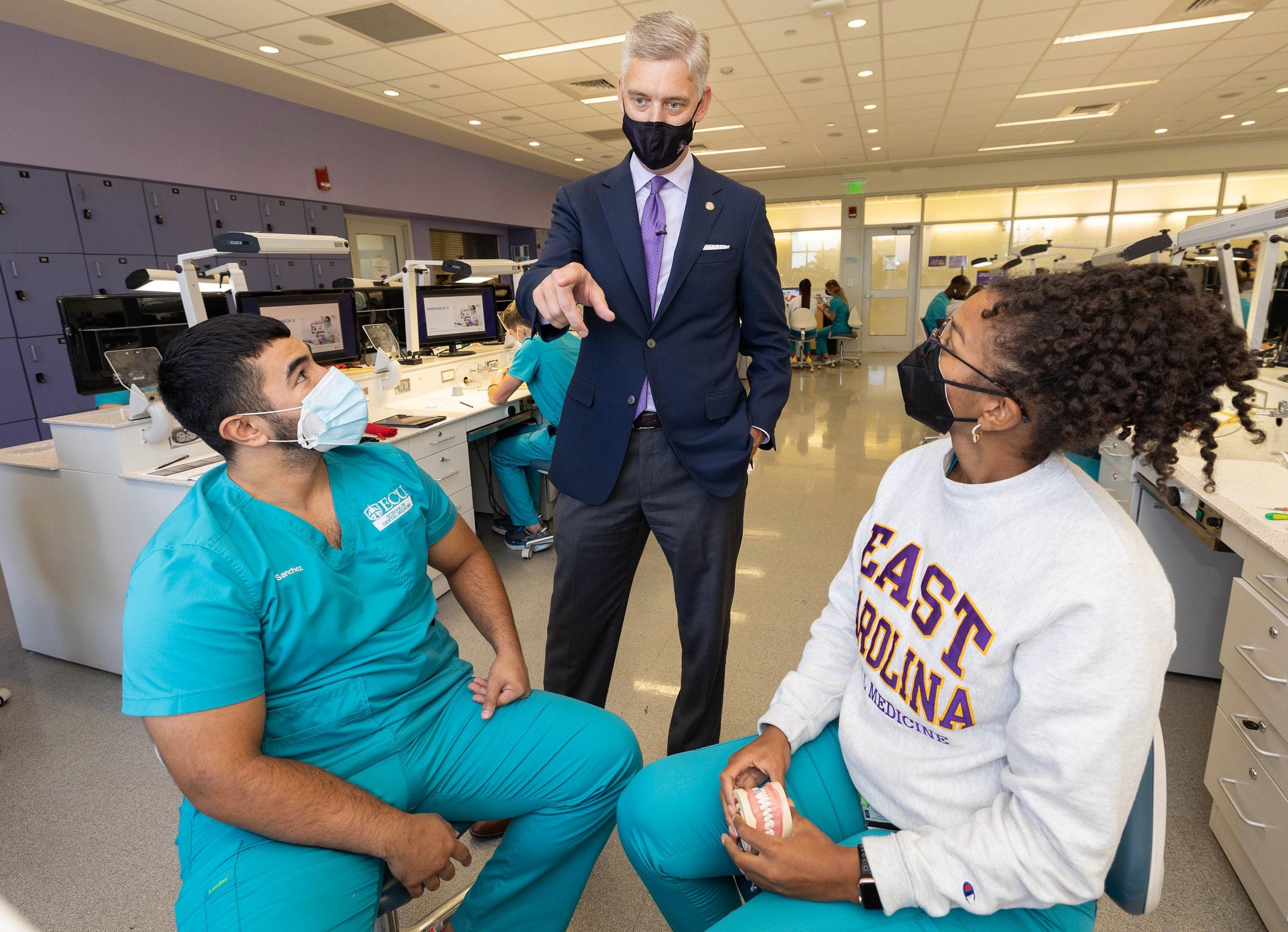
ECU Chancellor Dr. Philip Rogers talks with School of Dental Medicine students in Ross Hall’s Preclinical Techniques Lab.(Photo by Rhett Butler)
ECU’s dental school graduates are hard at work in 65 of the state’s 100 counties, helping bridge the oral health care gap that placed North Carolina toward the back of the pack nationally for dentist-to-patient ratio and sounded the alarm for the need for ECU’s dental school for the state.
Such statistics are what fuel ECU Chancellor Dr. Philip Rogers as well. His history with ECU is woven into the fabric of the dental school’s beginnings; from 2007 to 2013, he held various positions that allowed him a role in creating the school. From policy analyst to legislative liaison to chief of staff, Rogers spent hours strategizing and working with decision-makers at every level to make the school a reality.
His return to ECU in early 2021 coincides with the school’s 10-year milestone.
“It’s absolutely surreal to look at this facility that was nothing but a dream,” Rogers said. “Now this facility is literally changing the lives of thousands and thousands of dental patients across the state of North Carolina.”
Dr. Jorge Arriagada graduated with the school’s first class in 2015 and practices at Eastern Orthodontics and Pediatric Dentistry in Greenville. He’s kept in touch with school faculty and leaders and served as a resource for students. He’s watched the school evolve and grow not only in number, but quality.
“As I speak with current students, I see all the improvements that the program has obtained, like the ability of students to go on rotations to CSLCs, develop additional skills, and work on their time management before they start their new professional journey,” Arriagada said. “It gives an opportunity for students to be involved within the community and to narrow the gap in the dental needs our state faces.”
Third-year student Courtney Williams created and facilitated the school’s first Day of Unity in 2020, an event that encouraged the school community to not only find common bonds among them, but celebrate their cultural differences.
“For the next decade of students, I would hope that the school continues having a population of dental students that are representative of North Carolina,” she said. “I feel like we’re definitely on the right track as health care professionals that are representative of our communities.”
Visit this video on YouTube for the closed-captioned version.
Meeting the Need
As students in the Brody School of Medicine learn to earn their patients’ trust and look for ways to better serve the underserved, many are honing their Spanish skills to meet the needs of the state’s rising Hispanic population.
The Hispanic population in North Carolina grew by 40 percent from 2010-2020, and now represents 11 percent of the state’s population, according to U.S. Census data. With many of those unable to speak English fluently, when they have a health care issue, it can be difficult for members of this community to feel fully comfortable speaking with and understanding their providers. For providers, it can cause a serious barrier to patients having informed consent about available treatments.
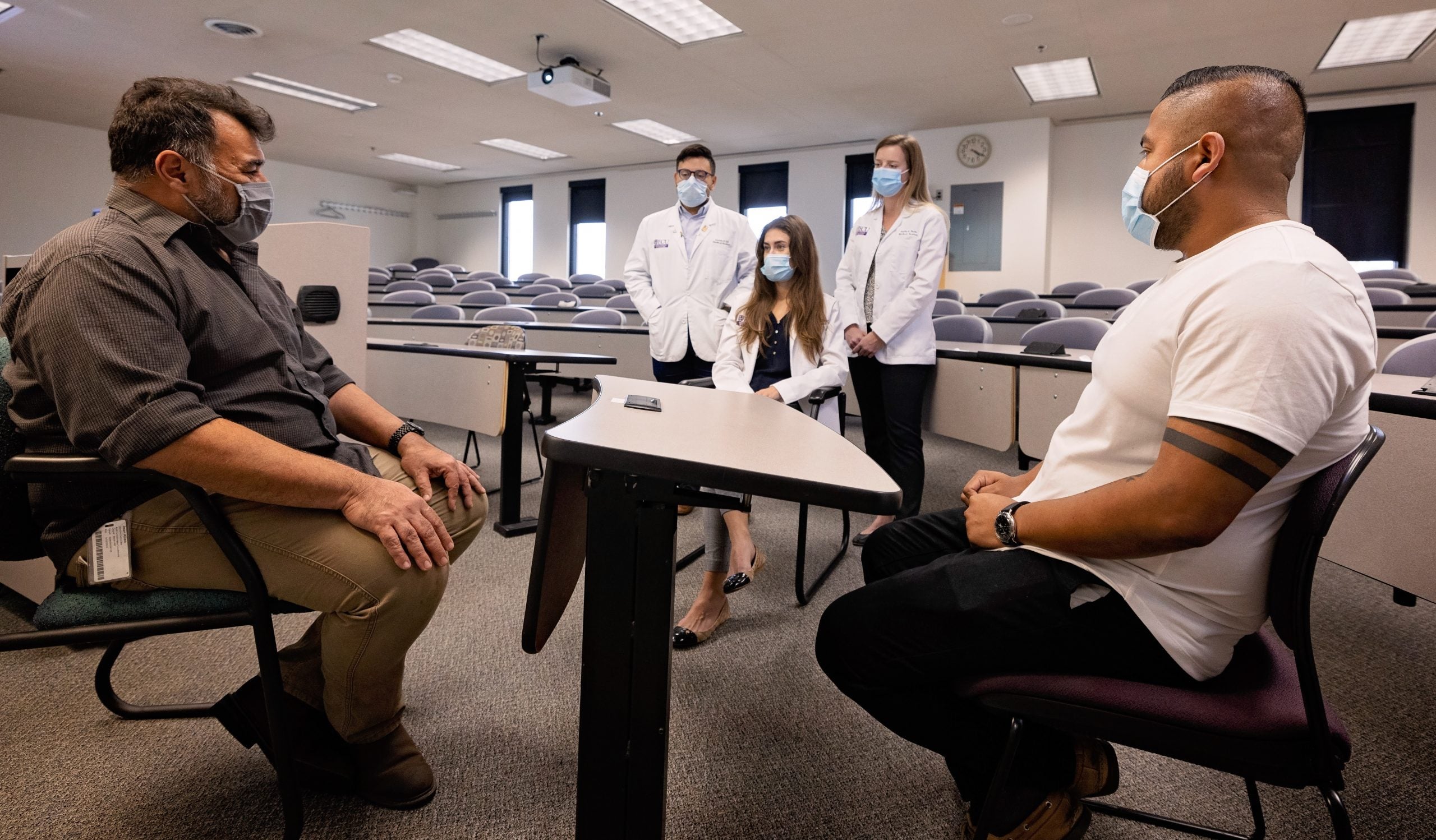
Brody School of Medicine students are honing their Spanish skills in order to better serve patients in rural eastern North Carolina. (ECU Photo by Cliff Hollis)
Students and faculty in ECU’s Division of Health Sciences are working to improve their skills in Spanish to make these patients more comfortable in the health care setting and raise the quality of care they’re able to provide.
“The amount of Spanish-speaking patients around here — it’s a lot. Knowing all the medical (terminology) is already very difficult, so adding a communication barrier makes it even more difficult,” said Jonathan Mendez, a medical Spanish interpreter with ECU Physicians, an ECU undergraduate student and an aspiring physician. “So, if you can break that, or at least help with that barrier, you can provide a much better service.”
Students from the Brody School of Medicine recently revived an extracurricular medical Spanish interest group designed to help current and future health care providers close the language gap and improve communication with Hispanic patients by speaking with them in their native language. The group meets monthly in the Health Sciences Student Center to practice speaking Spanish, with a special focus on medical terminology.
Emily Parks is a second-year medical student from Raleigh and president of the Medical Spanish Interest Group at the Brody School of Medicine. After speaking with some of her Brody classmates, she realized there were other students with a similar working knowledge of the language who were interested in improving their Spanish skills and using them in their medical practices.
“When I was talking to my classmates and realizing this was a need that I wanted to pursue, I realized that it was advanced Spanish speakers, both native and non-native speakers (who were interested),” Parks said. “I think we’re comfortable having a conversation in Spanish and we can communicate well, but when it comes to medical terminology and technical terms, or even just trying to rephrase something to help a patient understand, that’s where we need practice to be better providers in the future.”
Visit this video on YouTube for the closed-captioned version.
DHS Spotlight
In the spirit of excellence in education and a collaborative campus, we will be highlighting a variety of students, staff and faculty who represent the colleges and schools in the Division of Health Sciences.
This month, we meet Fernando Chivela, a graduate student in the College of Allied Health Sciences.
Growing up in Angola — a country on Africa’s west coast beset by civil war, poverty and preventable diseases — has inspired Fernando Chivela to use technology to improve access to quality health care in rural areas.
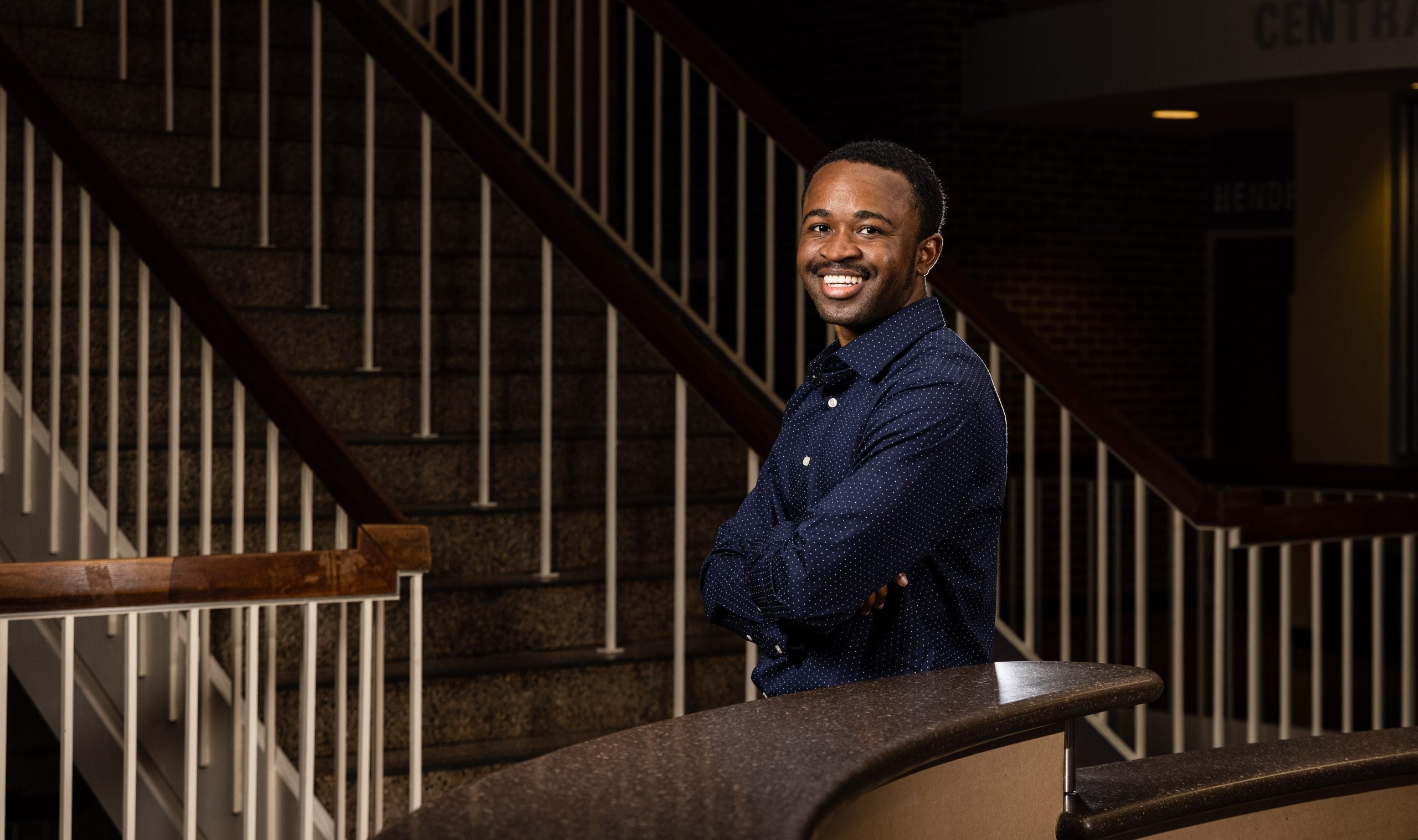
Fernando Chivela is a second-year graduate student in the health informatics and information management program in East Carolina University’s College of Allied Health Sciences.(ECU Photo by Cliff Hollis)
“I chose this career because underserved communities need and deserve sustainable health care systems that are technologically advanced,” Chivela said. “Creating these systems requires health informatics professionals familiar with the challenges of providing health care to underserved rural populations.”
Chivela is a second-year graduate student in the health informatics and information management program in East Carolina University’s College of Allied Health Sciences. The interdisciplinary program is designed to train professionals on how to acquire, store and use information, working as part of a health care team with clinicians and administrators.
“I chose ECU because of its mission to deliver improved health care to those living in rural communities,” he said. “ECU has been instrumental in helping me achieve my goals because of its unique academic curriculum in allied health sciences with hands-on experience and a broad clinical network with extensive rural service areas.”
One of Chivela’s off-campus experiences has been as a health care customer associate assisting Medicaid and Medicare clients.
“While helping insured individuals with their inquiries was an emotionally taxing and mentally challenging task, as one who gave every client my very best, I learned most profoundly how crucial health insurance and health literacy are to people’s well-being,” Chivela said. “This experience was invaluable to me and sparked my interest in patient empowerment and chronic disease research.”
Philanthropy
Sandra George Robinson holds two important “firsts” at East Carolina University.
She was the first nursing student deployed to war. And she was the first Black alumna to make a planned gift to the College of Nursing.
In 1990, Robinson was a junior nursing student in the Army Reserves preparing for final exams when she was called to active duty. Within two days she moved out of her apartment, notified her professors and reported for duty for Operation Desert Storm in Saudi Arabia. While being deployed to war wasn’t something she anticipated, the experience proved rewarding, leaving her with a profound sense of commitment and discipline.

Sandra George Robinson established the Sandra George Robinson ’92 Combat Female Veterans Scholarship in the College of Nursing and made a planned gift to establish scholarships for future nursing students. Robinson is the first Black alumna to make a planned gift to the college.
She returned to ECU nine months later and was able to graduate on time by loading up on classes. “I always share wonderful things about the university because of the support they gave me leaving and returning to the university,” she said. “All my professors helped me study for the exams I missed and brought me back up to speed on my nursing curriculum.”
After completing her nursing degree, Robinson spent almost 30 years working at various hospitals. She is also the North Carolina ambassador for Women in Military Service for America Memorial, a member of the American Legion and co-founder of the Desert Storm Combat Women organization.
“It’s an honor to be a nurse. Being trusted to help someone in their time of need is a major and important task,” Robinson said.
Thinking about her history and her future inspired her to give back to ECU. She established the Sandra George Robinson ’92 Combat Female Veterans Scholarship in the College of Nursing and made a planned gift to establish scholarships for future nursing students. Robinson is the first Black alumna to make a planned gift to the college.
“To be the first, it’s sad it took this long, but I’m glad to be able to make that difference. I hope many others join me,” she said. “When you have a successful college experience, and a successful professional experience after that, you’re an example of that hard work and the result of that college education. It gives me such a wonderful feeling to know that I’m giving back to a place that made me who I am today.”
For more information on how to support the College of Nursing, please contact Elizabeth Maxwell, director of development for the College of Nursing, at 252-744-6324 or maxwellg17@ecu.edu.
